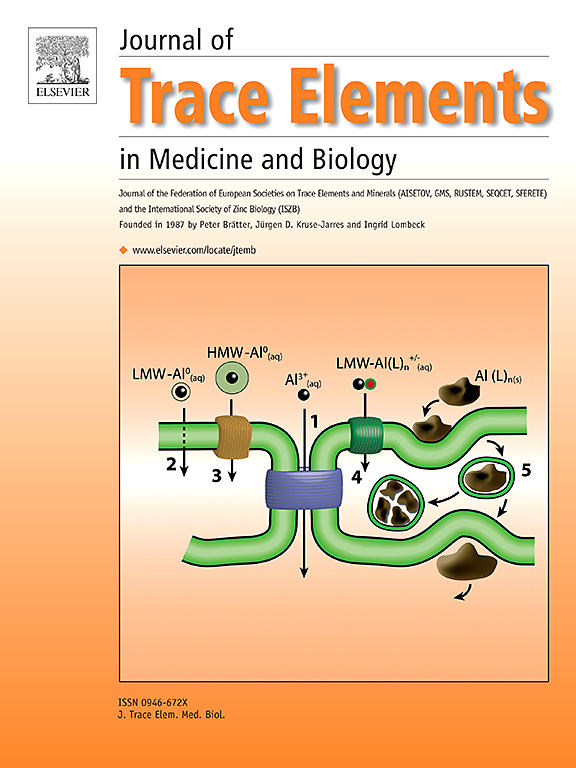Associations between magnesium depletion score and depression among individuals aged 20 to 60 years
IF 3.6
3区 医学
Q2 BIOCHEMISTRY & MOLECULAR BIOLOGY
Journal of Trace Elements in Medicine and Biology
Pub Date : 2024-10-09
DOI:10.1016/j.jtemb.2024.127543
引用次数: 0
Abstract
Background
Magnesium is closely associated with depression. The study aims to explore the relationship between magnesium depletion score (MDS), used to evaluate the body’s magnesium deficiency status, and depression.
Methods
This population-based cross-sectional study used data from the National Health and Nutrition Examination Survey in 2005–2018 and included adults aged 20 to 60 years. Depression was determined using the Patient Health Questionnaire-9 (PHQ-9). MDS was a practical assessment instrument used to assess the status of magnesium deficiency. Multivariable logistic and restricted cubic spline models were used to assess the associations between MDS and depression.
Results
Among the 18247 adults, 1753 participants were diagnosed with depression. Multivariable logistic regression analysis indicated that when MDS was treated as a continuous variable, each one-unit increase in MDS was associated with an odds ratio (OR) for depression of 1.15 (1.04, 1.26). When MDS was considered a categorical variable, compared to participants with MDS of 0, the ORs for depression for those with MDS of 1, 2, and ≥3 were 1.03 (0.87, 1.21), 1.41 (1.12, 1.78), and 1.58 (1.06, 2.35), respectively. Restricted cubic spline analysis showed that there was no non-linear relationship between MDS and the prevalence of depression. Subgroup analyses indicated the positive associations between MDS and depression were generally similar in different populations.
Conclusions
MDS may be positively associated with the prevalence of depression. In the future, additional longitudinal studies are needed to validate our findings and investigate potential mechanisms.
20 至 60 岁人群镁消耗量评分与抑郁之间的关系
背景镁与抑郁症密切相关。本研究旨在探讨用于评估人体镁缺乏状态的镁耗竭评分(MDS)与抑郁症之间的关系。方法这项基于人群的横断面研究使用了2005-2018年全国健康与营养调查的数据,研究对象包括20至60岁的成年人。抑郁症是通过患者健康问卷-9(PHQ-9)来确定的。MDS是用于评估镁缺乏状况的实用评估工具。结果在18247名成年人中,有1753人被诊断出患有抑郁症。多变量逻辑回归分析表明,当将 MDS 视为连续变量时,MDS 每增加一个单位与抑郁症的几率比(OR)为 1.15(1.04, 1.26)。如果将 MDS 视为分类变量,与 MDS 为 0 的参与者相比,MDS 为 1、2 和≥3 的参与者患抑郁症的几率比分别为 1.03(0.87,1.21)、1.41(1.12,1.78)和 1.58(1.06,2.35)。限制立方样条分析表明,MDS 与抑郁症患病率之间不存在非线性关系。亚组分析表明,在不同人群中,MDS 与抑郁症之间的正相关关系大致相似。今后,需要进行更多的纵向研究来验证我们的发现并调查潜在的机制。
本文章由计算机程序翻译,如有差异,请以英文原文为准。
求助全文
约1分钟内获得全文
求助全文
来源期刊
CiteScore
6.60
自引率
2.90%
发文量
202
审稿时长
85 days
期刊介绍:
The journal provides the reader with a thorough description of theoretical and applied aspects of trace elements in medicine and biology and is devoted to the advancement of scientific knowledge about trace elements and trace element species. Trace elements play essential roles in the maintenance of physiological processes. During the last decades there has been a great deal of scientific investigation about the function and binding of trace elements. The Journal of Trace Elements in Medicine and Biology focuses on the description and dissemination of scientific results concerning the role of trace elements with respect to their mode of action in health and disease and nutritional importance. Progress in the knowledge of the biological role of trace elements depends, however, on advances in trace elements chemistry. Thus the Journal of Trace Elements in Medicine and Biology will include only those papers that base their results on proven analytical methods.
Also, we only publish those articles in which the quality assurance regarding the execution of experiments and achievement of results is guaranteed.

 求助内容:
求助内容: 应助结果提醒方式:
应助结果提醒方式:


